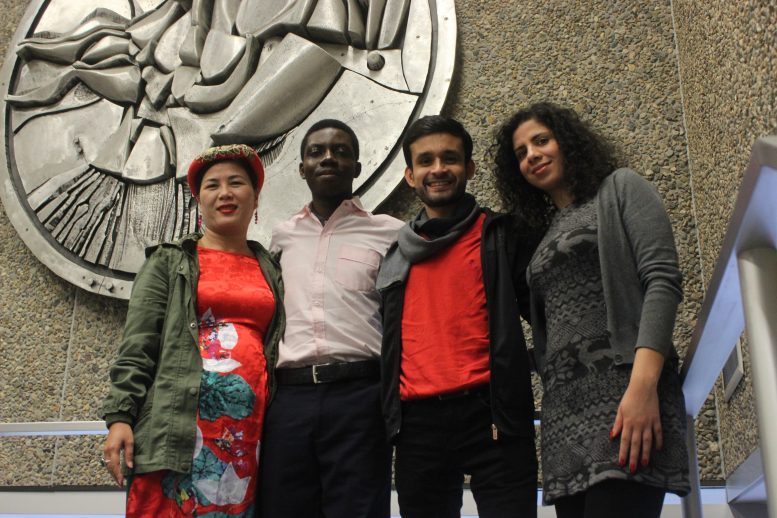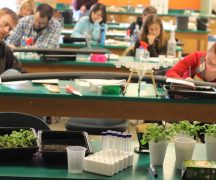By DAVID DUPONT
BG Independent News
The talk around the table in the Education Building comes in a rainbow of accents. Four teachers sit conversing in English, their second or third language. They hail from three continents – South America, Asia, and Africa, north and west.
And though they’ve only known each other for a few weeks and don’t share a mother tongue, they help each other out providing the English word a speaker is looking for, or re-pronouncing a word for the benefit of the English-only speaking reporter.
The four are all Teaching Excellence and Achievement Program Fellows. They are part of a contingent of 21 teachers from 21 countries in the developing world visiting Northwest Ohio through the auspices of the International Democratic Education Institute in the BGSU School of Teaching and Learning.
And this kind of interaction is the best part of the program, said Diego Mantilla, an English teacher from Columbia.
This is the sixth year Bowling Green State University has hosted TEA fellows, said Sharon Subreenduth, who is the principal grant writer and director. The program is funded through the State Department’s cultural and education board.
The TEA fellows receive instruction on campus where they study instructional technology, lessons in English and math pedagogy as well as engaging in discussions of gender equity. They also disperse to eight schools throughout the area, including Bowling Green High School, to do field work.
“This is more than a professional experience, it’s a human experience,” said Marwa Hajjej, a teacher from Tunisia.
“We’re like family,” said Vietnamese teacher Nguyen Bui Thuy Linh. “Sharon looks out after us like our mother.”
All, including Abayomi Abodunrin, a math and economics teacher from Nigeria, were chosen through rigorous selection process in their homelands and by the State Department.
A particular focus on the program is an emphasis on gender equality. Abodunrin said he became aware of ways in which he unconsciously was fostering gender equality.
When he returns home, he said, he will work on a project to get more girls involved in studying engineering and construction. Now if they study the STEM disciplines, it’s most likely related to medicine. But there are many opportunities in other STEM fields as well.
Mantilla said integrating lessons about gender equity and non-violence into their teaching is important. “We are teaching future leaders,” he said. And with what they are learning in Ohio they can “empower everyone.”
For him these lessons will have a multiplying effect because his high school students go out to elementary schools to help teach English.
Hajjej said she will also aim to spread her lessons about sexual harassment widely by using interactive theater techniques to create a play that can be shared over the internet.
Linh said that gender discrimination is especially a problem in some rural areas in Vietnam where in part because of poverty the belief persists that girls should stay at home and tend to traditional chores, and boys should go to school.
Teachers can help break this down, said Linh, who is both a teacher and a state school inspector.
Subreenduth said such problems are expected. Some teachers say that they are faced with economic and political problems, “survival issues,” that may overshadow social concerns. Especially when discussing sexuality and “gender outside the binary” they must confront religious and cultural norms, she said.
“We also discuss what role we as educators play in terms of being advocates of all students,” Subreenduth said. Regardless “they have a heightened awareness.”
But, she added, some countries “have more progressive laws and protections than we do.”
Hajjej said that what makes the TEA program special is the opportunity to go into classrooms and interact with students and teachers.
Those host teachers, Subreenduth said, also get a different perspective on their teaching through questions posed by the TEA fellows. “We do our best to make it a mutually beneficial collaboration.” All the TEA fellows make presentations at their host schools.
All were impressed with the inquisitive, creative nature of America students, and the level of respect teachers have for their charges.
“My first impression is that the school is way too casual,” Hajjej said. Like the others she was impressed by the technology. She teaches at Hull Prairie in Perrysburg. “Technology is good, but technology can be a bit distracting. Kids need to write things down, need actual books.”
Abodunrin agreed. He was surprised that during a lesson on motion, students had to rely on their calculators to do simple calculations.
For Mantilla, though, this is a matter of students being students. “They are talkative and like standing up. … They are eager to learn. I really see more similarities.”
Hajjej said often the students ask more interesting questions than the adults they encounter.
Mantilla said he wondered what he would encounter when he was told he was assigned to Gibsonburg, a rural school. He had an image of a rural school in Columbia. Urban schools, he said, are equivalent to those in the United States, but rural schools hardly have the basics.
But Gibsonburg had all the amenities, from technology in the classrooms to large impressive athletic fields, that urban and suburban schools have.
Abodunrin said that urban-rural divide exists in Nigeria as well, where a chalk board may be high tech in some places.
One aspect of American education, though, they are glad is not shared is the cost of college. Their education through graduate school is almost free, maybe $20 a semester in tuition at a public school, which are considered the best.
Subreenduth said the program makes sure they have cultural experiences, including trips to the Toledo Museum of Art and other attractions. Over Presidents Day weekend, some traveled to Chicago. Hajjej said she enjoyed “getting lost” in the city, and exploring using public transportation.
Abodunrin skipped the Chicago trip to realize a dream. He traveled to Cleveland to see the Rock and Roll Hall of Fame.
For the fellows the experience will not end when they return home. They expect to keep in contact with each.
Lihn said she hopes to establish an exchange program so American and Vietnamese students can travel to each other’s country, and experience for themselves the benefits the teachers have.
Hajjej hopes to be able to connect her students in Tunisia with those in Perrysburg.
Abodunrin said they all appreciate the work done by their American hosts at BGSU and in the area schools.
“They learn so much from each other,” Subreenduth said. “It’s powerful for really passionate, social justice oriented teachers who are already accomplished in their fields to come together and work through so many important global and local issues because these issues have implications for all of us, whether in Nigeria or Ohio.”


